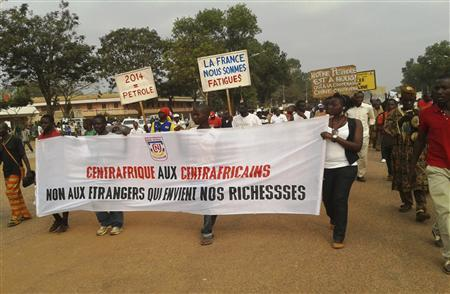Central African Republic: U.N. Peacekeeping Forces Face Multitude Of Challenges In Troubled Nation

The unanimous vote Thursday by the U.N. Security Council to authorize an African Union peacekeeping mission backed by French soldiers in the Central African Republic is good news for the 4.6 million people of the remote nation plagued by months of instability and sectarian violence between Muslim and Christian communities. But major challenges remain.
The fighting has forced an estimated 465,000 people from their homes and created a massive humanitarian crisis that has resulted in large-scale looting, summary executions, widespread sexual violence and the forced recruitment of roughly 6,000 child soldiers, according to the U.N. The unstable security situation has rendered humanitarian access to displaced populations extremely difficult. Adequate funding for an effective international relief effort is still lacking.
The current African peacekeeping force in the Central African Republic has been unable to confront armed combatants or protect civilians due to a lack of capacity, training and experience. The original force, which now stands at around 2,800 uniformed personnel from neighboring countries, was deployed in 2008 with an intention to exit by 2012, but never left.
Under the U.N. Security Council resolution adopted Thursday, the force will be enlarged and backed by an additional 1,200 French troops to join the 600 French personnel already in the Central African Republic, a former French colony.
Should the strengthened African force prove insufficient to restore security and protect the civilian population, the option of transforming it into a U.N. peacekeeping mission remains on the table.
Any peacekeeping force faces multiple challenges in the country:
The Central African Republic is larger than France in area. A peacekeeping force will have to be sufficiently strong and mobile to deploy rapidly to remote areas, despite a lack of basic state infrastructure.
The institutions in the Central African Republic are so weak that it will be almost impossible for a peacekeeping force to quickly withdraw and safely hand over power to a newly elected government in the short term. The U.N. needs to prepare for a long-term commitment to disarmament and demobilization of combatants and reforming government institutions such as the police, army and judicial system.
Peacekeepers will also have to deal with the vicious cycle of sectarian violence now gaining dangerous momentum, while at the same time maintaining the support and trust of local communities and parties to the conflict.
The presence of foreign fighters in the Central African Republic means that a lasting peace will require the support of the neighboring states – three of which are themselves hosting U.N. peacekeeping missions.
For the moment, the most pressing concern is the restoration of some level of stability and security to allow humanitarian relief workers access to people in greatest need, and prevent further atrocities.
The origins of the current crisis in the Central African Republic date back to 2007, when former President François Bozizé signed a peace deal that integrated the Séléka, a loose rebel coalition, into the national armed forces. In late 2012, the Séléka deserted, and Bozizé was deposed in a coup in March.
The Séléka then officially disbanded and its members were asked to disarm by the transitional government, headed by former Séléka leader Michel Djotodia. However, most of the combatants continue to carry arms and are attempting to gain control of the resource-rich country by terrorizing the civilian population – a goal made easier by the weakness of the army and police.
The escalating violence between the Central African Republic’s Christian majority and Muslim minority has added a deeply troubling sectarian dimension to the conflict. Many of the ex-Séléka rebels are mercenaries from Chad and Sudan, and most are Muslim.
The presence of the Muslim forces in the Central African Republic has led to the formation of self-defense militias within Christian communities, which have reportedly targeted Muslim civilians in retaliation for abuses committed against Christians by the ex-Séléka. Accounts of such reprisal attacks, and rumors that Muslim communities have supported the ex-Séléka, have combined to create a climate of fear and suspicion amongst the population.
Advocacy organizations such as Human Rights Watch have argued that an African force cannot do enough to prevent a total escalation of the conflict, and have called for a swift transformation of the African force into a robust peacekeeping operation under U.N. command. They see the U.N. as better equipped to manage the kind of complex emergency that has been unfolding in the Central African Republic.
While not creating a U.N. force at this point, the Security Council has finally moved to change the power dynamics on the ground by reinforcing the African peacekeeping presence. As the Central African Republic’s population struggles with destabilization, sectarian violence and a humanitarian emergency, the international community can only hope that its renewed attention can help to turn the tide of the crisis.
Katharina Nachbar is an intern at the Stimson Center, a nonprofit and nonpartisan international security think tank, and a graduate student studying International Peace and Conflict Resolution at American University.
© Copyright IBTimes 2024. All rights reserved.





















